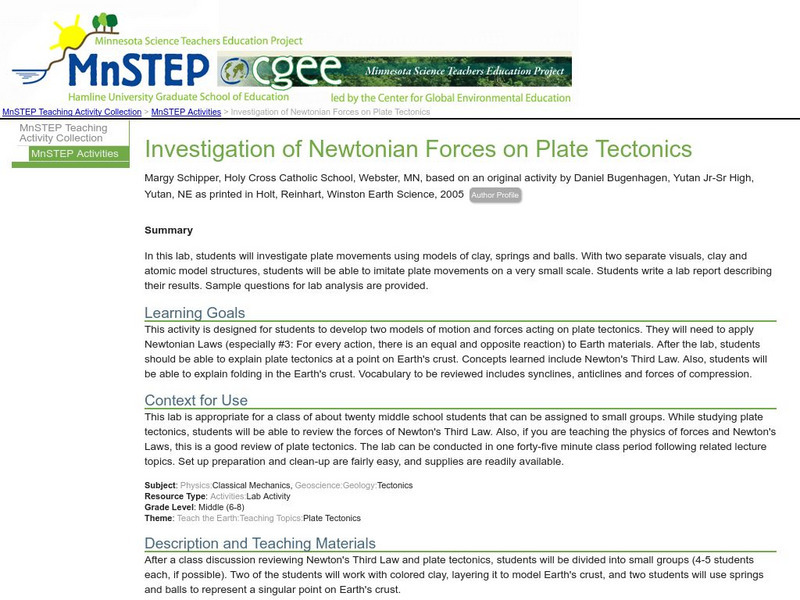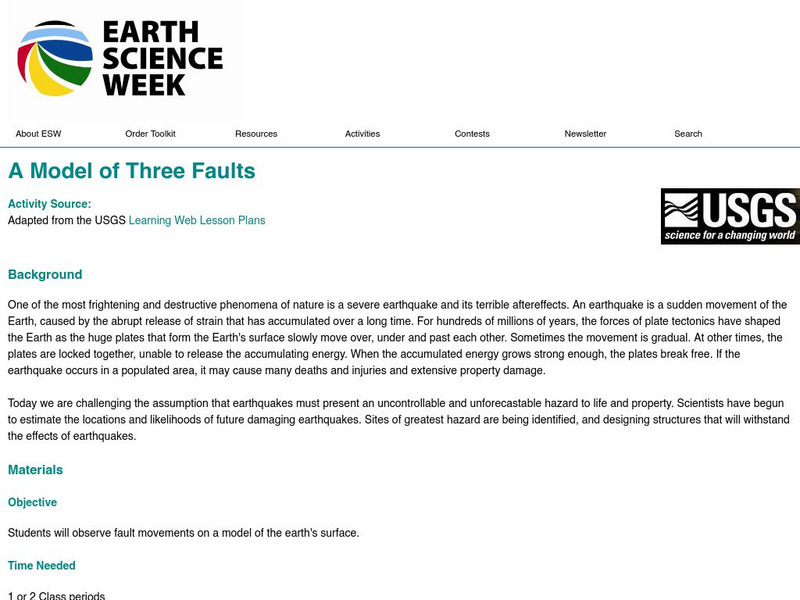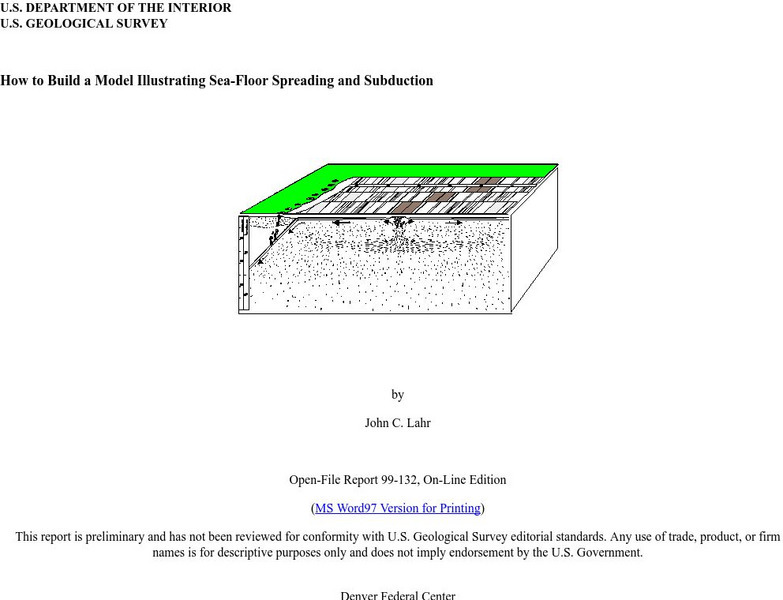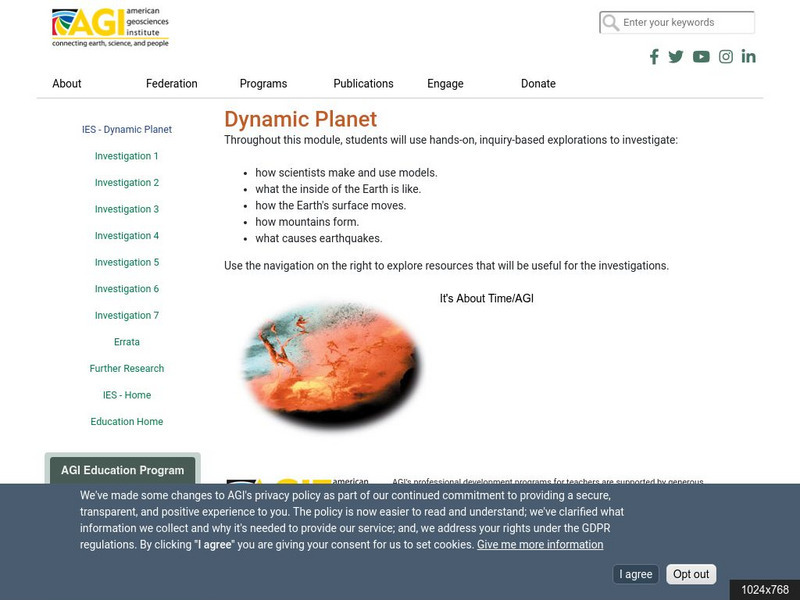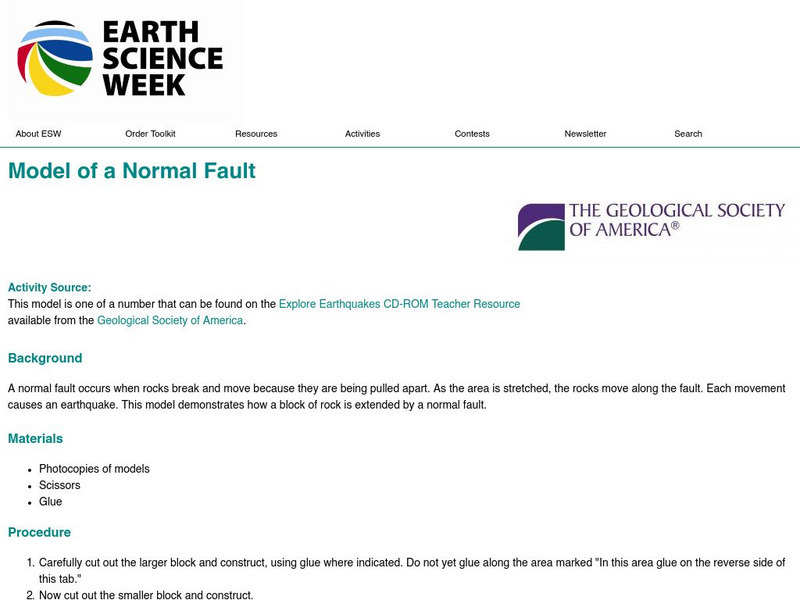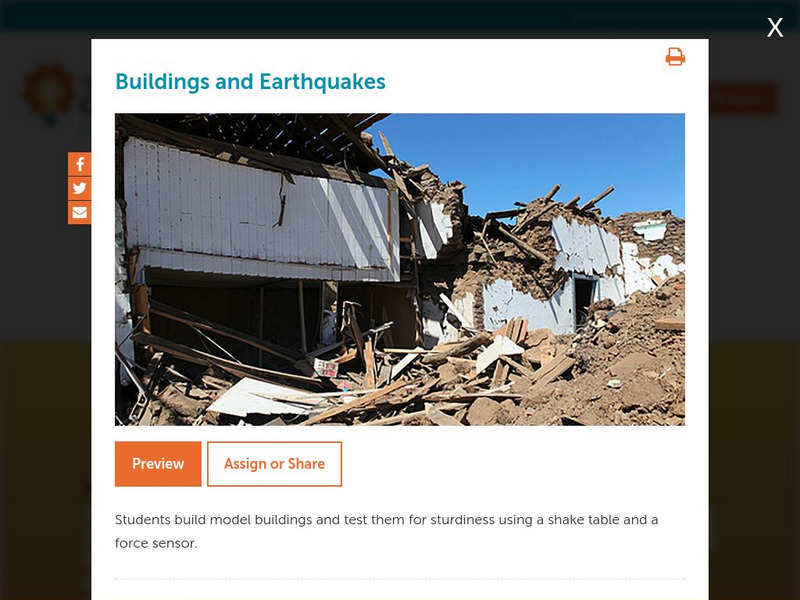Hi, what do you want to do?
Curated OER
Impact Craters: Holes in the Ground!
Students simulate crater formation through a lab activity. In this space science lesson, students calculate how much energy is transferred during meteorite impact. They identify different factors affecting the size and depth of craters...
Curated OER
Volcano Lesson Plans
Volcano and earthquake lessons can provide a great way to link science instruction to current events.
Curated OER
The Rock Cycle
Students study the rock cycle of different types of rock. They arrange cut-outs of the parts of the rock cycle in the correct order and then draw the rock cycle or research different types of rocks.
Curated OER
A Crust Full of Rocks
In this rock worksheet, students answer seven short answer questions about the composition of the earth's crust. Questions refer to metamorphic, igneous, and sedimentary rocks.
Curated OER
Shake, Rattle and Erupt
Students study myths regarding four earthquakes myths. They receive a list of supplies each family should have at home to prepare for an earthquake and construct an "Earthquake Preparation" poster showing some of the most important items...
California Academy of Science
Measuring Earthquakes
After a brief discussion on earthquakes, make a makeshift seismograph to record the shaking of the table that it sits upon. While the background information will be useful to you as a teacher, the seismograph does not seem like it would...
Curated OER
Change Happens
Fifth graders engage in a lesson to find information about the natural history of Puerto Rico. They practice using a variety of resources for research purposes. The same process of research is used for state of Wisconsin. Then students...
Curated OER
Enslaved and Running
Students use runaway slave advertisements to discover how the language varies from the 18th to 21st century. Using primary source documents, they research the brutality of slavery and the desire of those in slavery to be free. They...
Curated OER
Natural Hazards
Students evaluate the hazards of naturally occurring events. After watching a video concerning safety hazards, students work in groups to discuss the safety issues involved in taking a trip to a mountainous region. Recommendations are...
Curated OER
Volcanoes
Students explore the formation of volcanoes. In this earth science lesson, students build their own volcanoes in the lab using different materials. They identify the different types of volcanoes.
Science Education Resource Center at Carleton College
Serc: Investigation of Newtonian Forces on Plate Tectonics
An investigation for students to understand plate tectonics by using models to see how motion and forces act on the plates. Students can use these models to see the connection between Newtonian Laws to Earth materials. Lesson plan...
American Geosciences Institute
American Geosciences Institute: Earth Science Week: A Model of Three Faults
In this instructional activity, students learn about the different kinds of faults and plate boundaries and where they can be found. They research and report on the faults that are present in their state. They are also asked to develop...
National Earth Science Teachers Association
Windows to the Universe: Snack Tectonics
Students create a model using food that simulates the layering and movement of tectonic plates. Overheads are provided that demonstrate different ways to position the graham crackers, frosting, and fruit roll-ups to emulate how the...
US Geological Survey
Usgs: How to Build a Model Illustrating Sea Floor Spreading
This is a comprehensive website featuring how to build a model that illustrates sea-floor spreading and subduction. It has diagrams and pictures reviewing major geological concepts.
Concord Consortium
Concord Consortium: Exploring Earth's Seismicity
This sequence is an introduction to plate tectonics using evidence from topographical maps, earthquake location and depth, and volcano location using the Seismic Explorer model to investigate patterns of earthquake data and to infer the...
American Geosciences Institute
American Geosciences Institute: Dynamic Planet
Seven hands-on lessons module where students learn about our dynamic planet. These inquiry-based explorations investigate scientific models, earthquakes and seismic waves, Earth's interior, Earth movements, the lithosphere, plate...
American Geosciences Institute
American Geosciences Institute: Earth Science Week: Model of a Normal Fault
Students construct a model that demonstrates how a block of rock is extended by a normal fault.
Science Education Resource Center at Carleton College
Serc: Hawaiian Islands: Volcano Ages, Hotspots and Plate Motion
The ages of volcanic rocks are used to investigate speed of motion of the Pacific plate, to analyze the distinctive bend in the chain, and to consider the age data in the context of a hotspot model of formation.
Science Education Resource Center at Carleton College
Serc: Fairly Simple Geology Exercises
A collection of geology exercises which include relevant background information, complete instructions, student handouts, and answer keys. Topics include rock and mineral identification, Bowen's reaction series, crystal models,...
Science Education Resource Center at Carleton College
Serc: Aboard Alvin
This Gulf of Maine educational website takes young scholars aboard the submersible Alvin. It includes informational pages such as a project overview, as well as pages about Alvin, hydrothermal vents, and the researchers involved in the...
Incorporated Research Institutions for Seismology
Iris: Earthquake Machine: Basic One Block & Simple Graph Animated
Animation of the single-block "Earthquake Machine" model shows how "Forces, Faults, and Friction" interact. [0:16]
Concord Consortium
Concord Consortium: Stem Resources: Buildings and Earthquakes
Do you think you can build a house that can withstand the shaking from an earthquake? In this activity, students design and construct model building that will be tested on a shake table with a force sensor. Activity includes questions...
National Association of Geoscience Teachers
Nagt: Bringing the Geologic Time Scale Down to Earth in the Students' Backyard
This activity is specifically designed for a field trip to Drayton Hall, which is a historic plantation near Charleston, South Carolina. It does provide a model of how a similar activity could be designed for a local area, and there are...
TeachEngineering
Teach Engineering: Faulty Movement
In this activity, students are introduced to faults. They will learn about different kinds of faults and understand their relationship to earthquakes. The students will build cardboard models of the three different types of faults as...















